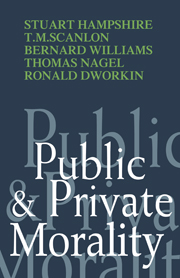6 - LIBERALISM
Published online by Cambridge University Press: 05 June 2012
Summary
In this essay I shall propose a theory about what liberalism is; but I face an immediate problem. My project supposes that there is such a thing as liberalism, and the opinion is suddenly popular that there is not. Relatively recently – sometime before the Vietnam War – politicians who called themselves ‘liberals’ held certain positions that could be identified as a group. Liberals were for greater economic equality, for internationalism, for freedom of speech and against censorship, for greater equality between the races and against segregation, for a sharp separation of church and state, for greater procedural protection for accused criminals, for decriminalization of ‘morals’ offenses, particularly drug offenses and consensual sexual offenses involving only adults, and for an aggressive use of central government power to achieve all these goals. These were, in the familiar phrase, liberal ‘causes’, and those who promoted these causes could be distinguished from another large party of political opinion that could usefully be called ‘conservative’. Conservatives tended to hold the contrary position to each of the classical liberal causes. In this essay I shall propose a theory about what liberalism is; but I face an immediate problem. My project supposes that there is such a thing as liberalism, and the opinion is suddenly popular that there is not. Relatively recently – sometime before the Vietnam War – politicians who called themselves ‘liberals’ held certain positions that could be identified as a group.
- Type
- Chapter
- Information
- Public and Private Morality , pp. 113 - 143Publisher: Cambridge University PressPrint publication year: 1978
- 141
- Cited by



